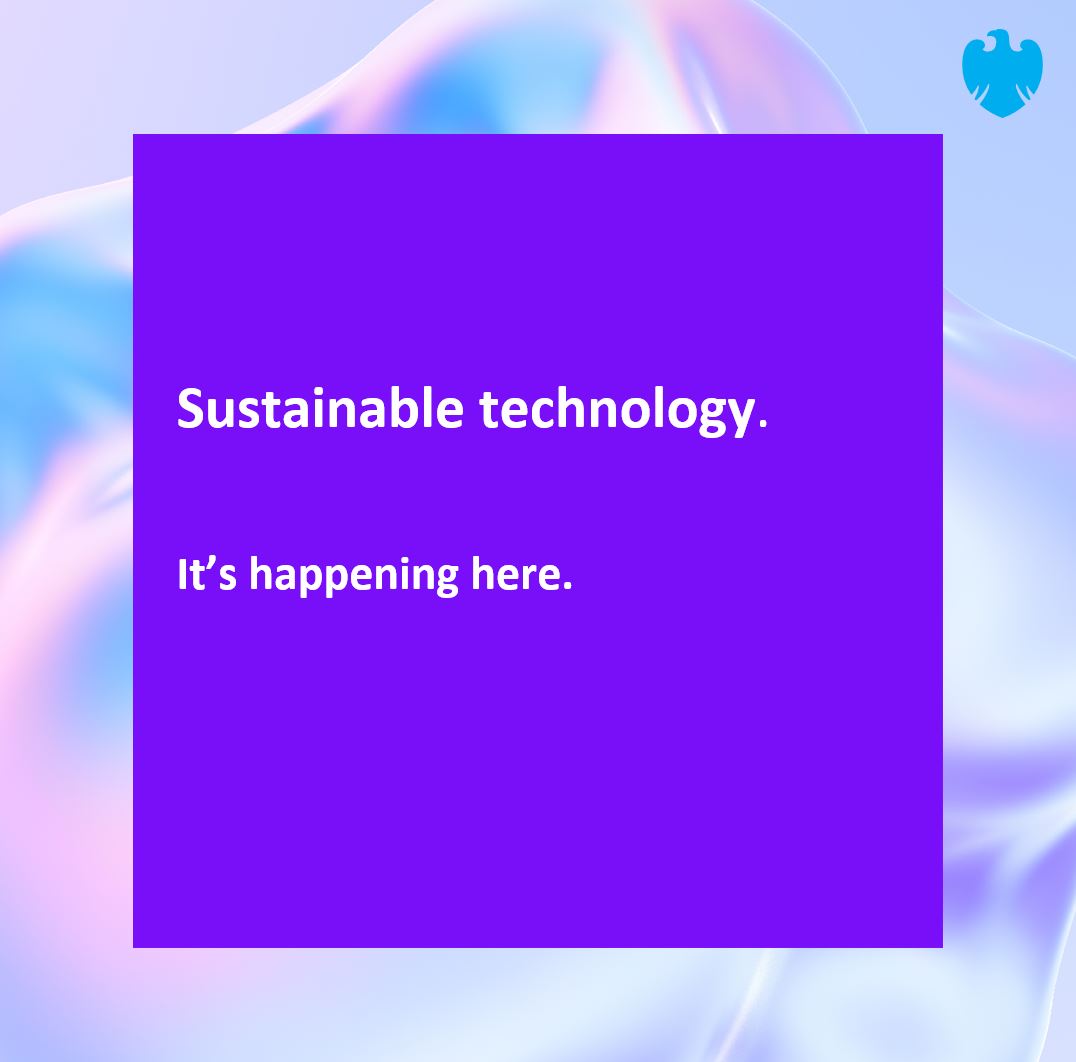Addressing climate change is an urgent and complex challenge. It requires a fundamental transformation of the global economy. It also requires everyone to get involved. And the technology teams at Barclays are determined to play their part.
Every aspect of our sustainability strategy will touch the people who work in tech at Barclays. Because everything we do is based on, and delivered through, technology. And nowhere is that clearer than in our drive to decarbonise our operations.
Technology and Barclays’ global influence
Technology people at Barclays play a pivotal role in the global economy, because their work sits at the core of the world’s largest and most influential financial institutions. Governments, global corporations and tech giants look to us to provide the finance that makes the global economy work. Millions of people trust us to help them do their daily shopping, buy their homes and plan their financial futures.
Day in, day out, we’re focused on turning technology into tangible outcomes. So, it’s hard to think of somewhere your tech skills could have a greater positive impact on a larger scope and diversity of people. And it’s hugely rewarding when we see what that means for real people’s lives.
Barclays’ commitment to sustainability and net zero goals
But the very fact that we’re so central to Barclays’ purpose, means that it’s critical that we take responsibility for the sustainability of our operations. Barclays has a vital role to play in helping the global economy transform to address the urgent and complex challenges of climate change.
In March 2020, we announced an ambition to be a net zero bank by 2050. Our strategy to reach that ambition covers has three elements:
1. Achieving net zero operations.
2. Reducing financed emissions
3. Financing sustainable transition across the global economy.
Technology has a major part in our carbon footprint
Technology is a significant part of our operational carbon footprint. That’s hardly a surprise when you think that practically every piece of tech is attached to a plug or a power line at some point. But our datacentres alone account for 40% of Barclays operational CO2 emissions. And we can’t just switch them off. Keeping our data – and the data of our customers, clients and partners - secure, accessible and accurate isn’t just the most business critical technology task we undertake. It also goes to the heart of our legal and regulatory responsibilities as a financial institution.
Office of Sustainability
That’s why we created the Technology Office of Sustainability. Lead by Alistair Bradley, the team sits in our GTIS function, where the major infrastructure decisions are made about the day-to-day running and long-term planning of our enterprise technology. The team’s purpose is to make meaningful reductions in the impact that technology has on our emissions. And to help people across our 30,000-strong tech community to contribute to decarbonising our operations.
Putting sustainable thinking at the heart of all that we do
Alistair and his team of expert evangelists are working to put sustainability at the heart of decision-making across Barclays tech teams. That starts with education - on the impact we make today and on all the ways we can help to drive towards net zero.
First, it’s vital to be clear on where we stand. Then we can set goals, challenging people to reduce our impact against that baseline
The next stage is creating the frameworks and providing the information that help our people to make the right decisions. That might mean bringing a sustainability lens to the procurement of the products and services we need. It might mean investing in archiving technology that powers down when its not in use. Or it might mean understanding that the correlation between writing code more effectively and building on more efficient platforms can deliver significant reduction in the impact of one of our applications.
At the simplest level, writing fewer lines of code to deliver the same result means less data storage, which means fewer emissions. A single piece of code is a tiny droplet in the massive cloud of all Barclays’ data. But if every piece of code we write, and every platform we build, for every application we design, is more efficient, it matters. Every small step we take can make a difference – just like the personal choices we make to reuse and recycle products every day.
The overall aim is to bake sustainable thinking into the way we do everything in tech, and across Barclays. For now, though the Technology Office of Sustainability is focused on five key areas:
Circular economy / Promoting a circular economy
The digital world may seem like it floats weightless in the air all around us, but there is a lot of physical hardware involved, including the devices we use to access those virtual and online spaces. So we’re committed to making conscientious procurement decisions, looking at ways to manage the lifecycle of our hardware effectively, and reduce waste to landfill or incineration.
Cutting our hosting emissions
The vast majority of technology emissions result from hosting our applications. But not all data storage is equal. A datacentre’s emissions are affected by how it is designed, powered and cooled. By making smart decisions about what parts of our data are stored in our own physical facilities, what moves to the Cloud, and which vendors we choose for our Cloud storage, we are constantly finding new ways to reduce this footprint.
Improving the efficiency of our apps
We’re labelling every app we run with a simple energy efficiency rating, like you find on a new fridge or TV. This allows tech teams to understand the impact of their applications, set annual targets to increase efficiency and take tangible, measurable actions on climate change.
Monitoring the footprint of every app
We’re also giving our teams the metrics to understand the carbon footprint of the individual applications we run. An efficient app that’s used by millions of personal banking customers worldwide still creates greater emissions than a less efficient app used by a small handful of institutional investors. So, our teams need to know how much carbon their apps are actually responsible for. That way, we can set the right priorities for Barclays and provide accurate and credible sustainability data to our customers and clients.
Sustainable supply chains
With such a large team, and such a major role to play in every aspect of our banking operations, it’s hardly surprising that Enterprise Technology is one of Barclays’ biggest consumers. From the people who provide the physical equipment our technology runs on, to the software and services companies who help us build our world class applications, it’s vital that we manage our supply chain effectively to reduce the emissions created by suppliers on our behalf.
Creating emotional connection and personal contribution
The Office of Sustainability gives our people the data, insight and support they need to make an emotional connection, and personal contribution, to Barclays’ commitment to address climate change.
Sustainability September
Ultimately, the keys to driving positive change are the same as every tech challenge that Barclays faces: accurate data, open collaboration, and passionate people. If we educate our tech teams on the challenges we face, they will come together to develop solutions that reduce our footprint. That’s why Alistair and his team bring everyone in tech together every September for a series of events around sustainability.
Sustainability September is a unique opportunity to bring the technology group together to discuss the latest developments in the sustainability space. By showcasing a diverse range of views, from external thought leaders, to partners and our own internal experts, we’re able to drive important conversations on sustainability. The aim is to give our tech teams insight, generate new thinking and share ideas that help reduce our carbon footprint.
Next-generation thinking for a sustainable future. It’s happening here.



